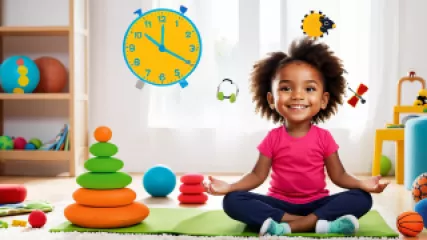10 Best Practices for Managing Hyperactivity in Children
10 Best Practices for Managing Hyperactivity in Children
Parenting a child with hyperactivity can be a challenging yet rewarding experience. As a parent, you want to help your child manage their energy and impulses in a healthy and constructive way. Fortunately, there are proven strategies and best practices that can make a significant difference in supporting a child with hyperactivity. In this comprehensive guide, we'll explore 10 of the most effective approaches to managing hyperactivity in children.
1. Establish a Structured Routine
Children with hyperactivity often thrive when they have a predictable schedule and clear expectations. Implement a consistent daily routine that includes designated times for meals, schoolwork, physical activity, and rest. This structure can help your child feel more secure and better able to regulate their behavior.
2. Incorporate Physical Activity
Regular physical activity is crucial for children with hyperactivity. Engage your child in a variety of exercises, such as outdoor play, sports, dance, or yoga. This not only helps burn off excess energy but also improves focus, coordination, and overall well-being. Aim for at least 60 minutes of physical activity per day.
3. Encourage Mindfulness and Relaxation Techniques
Teaching your child mindfulness and relaxation techniques can be incredibly beneficial for managing hyperactivity. Introduce practices like deep breathing exercises, progressive muscle relaxation, or guided imagery. These strategies can help your child develop self-awareness and the ability to self-regulate their emotions and behaviors.
4. Provide Sensory Breaks and Stimulation
Children with hyperactivity may benefit from sensory breaks and stimulation throughout the day. Incorporate sensory-rich activities, such as playing with textured toys, listening to calming music, or engaging in tactile experiences. These breaks can help your child reset and refocus their attention.
5. Foster Strong Communication
Open and effective communication is key when supporting a child with hyperactivity. Encourage your child to express their thoughts, feelings, and needs, and listen actively to understand their perspective. This not only strengthens your relationship but also helps your child develop important self-expression and emotional regulation skills.
6. Implement Cognitive-Behavioral Therapy (CBT)
Cognitive-Behavioral Therapy (CBT) is a highly effective approach for managing hyperactivity in children. CBT helps your child identify and replace negative thought patterns and behaviors with more positive, adaptive ones. This can lead to improved impulse control, attention, and emotional regulation.
7. Provide Positive Reinforcement
Positive reinforcement is a powerful tool in managing hyperactivity. Recognize and praise your child's efforts, successes, and positive behaviors, rather than focusing solely on the challenging ones. This approach can increase your child's motivation, self-esteem, and willingness to cooperate.
8. Collaborate with Teachers and Caregivers
Effective management of hyperactivity requires a team effort. Collaborate closely with your child's teachers, therapists, and other caregivers to ensure a consistent and supportive environment. Share strategies, progress, and concerns to ensure a coordinated approach that benefits your child.
9. Encourage Healthy Lifestyle Habits
Maintaining a healthy lifestyle can have a significant impact on managing hyperactivity. Ensure your child gets adequate sleep, eats a balanced diet, and limits screen time and other sedentary activities. These lifestyle factors can greatly influence your child's ability to focus, control impulses, and regulate their energy levels.
10. Seek Professional Support
If you're struggling to manage your child's hyperactivity, don't hesitate to seek professional support. Consult with a pediatrician, child psychologist, or specialized therapist who can provide personalized guidance and access to evidence-based interventions. This can help you develop a comprehensive plan to support your child's unique needs.
Managing hyperactivity in children requires patience, creativity, and a multifaceted approach. By incorporating these 10 best practices, you can empower your child to develop healthy coping strategies, improve their self-regulation, and thrive in various aspects of their life. Remember, every child is unique, so be prepared to adapt and find the strategies that work best for your family.






